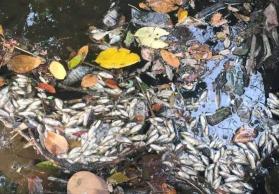On Global Environment Day, Water Defenders in El Salvador Were Barricaded by Riot Police
On World Environment Day, June 5, upwards of 16,000 people in San Salvador took to the streets for the 19th annual Caminata Ecológica (Ecological Walk), calling for land and water rights and an end to the right-wing water privatization campaign. This urban pilgrimage began in 2000 as a way of visibilizing the country’s environmental issues and organizing popular support behind them. Traditionally, it ends at the Casa Presidencial (Presidential House), where the collective of social movement organizations, environmental activists, civil society representatives, students, indigenous communities, church leaders, unions, and others present a letter to the president outlining their environmental priorities and calling upon the government to act. This year, however, the march was stopped several blocks short of its destination by anti-riot police and barbed-wire barricades that prevented organizers from delivering the letter.
The Caminata carries a different theme every year; this year’s theme was “Water and Territory,” reflecting the looming threat of water privatization and right-wing efforts to remove the limits enshrined in the 1983 constitution on the concentration of land in the hands of individuals and corporations. The demands were centered around the social inequality, vulnerability, and exclusion generated by environmental degradation, privatization of resources, and pro-corporate policies. They included the following:
- Prompt approval of the General Water Law that would guarantee the human right to water and community control of water management
- Measures to guarantee a system of food sovereignty for all Salvadorans
- Attention to the contamination of the Lempa River by mining projects in neighboring Guatemala and Honduras that impact cross-border basins
- Commitment to energy conservation policies and transition to an era of clean energy
- Continuation of national reforestation projects; good news on this front came out on the day of the march, as the Legislative Assembly announced that it would recognize El Salvador’s forests as living entities, in response to social movement pressure
- Reform to the National Policy of Civil Protection to take a preventative approach to risk and disasters such as droughts and floods, and to center the rights of the people over private entities and trade.
As the global climate crisis nears the threshold for irreversible damage, dialogue between environmentalists and governments has never been more urgent, and this is especially true in Central America where drought, floods, and other climate phenomenon are already forcing farmers off their land, destabilizing agricultural production, and disrupting the lives of many. In El Salvador, which suffers from all of the above, the water crisis intensifies the effects of climate change, especially among poor and other marginalized populations for whom water scarcity is a life-or-death issue.
In this context, the marchers found the (dis)missed opportunity for dialogue with the new president regrettable: “It had been announced in advance that the march would end at the Presidential House, and we expected a commission to receive the requests regarding the environmental issues that concern us,” an organizer said. "During the June 5 Ecological Walk, we got a sample of what this government will be like. Those who received us were the riot police; there was a fence with riot gear. This is a sample of what Nayib Bukele and this government will be like for El Salvador," said another.
The hostility demonstrated on June 5th on behalf of the new administration seems only to confirm the reservations of the social movement regarding President Bukele: his stance toward popular organizing and expression, his engagement with the concerns of the public, his intentions toward environmental action, his alignment with right-wing interests, and his capitulation to US foreign policy objectives, to name a few.
Even when organizers of the march attempted to negotiate delivery of the letter to a presidential representative by as few as five participants, the offer was refused. From behind razor-wire barricades, people chanted, "Nosotros no somos terroristas, somos ambientalistas, somos luchadores sociales, somos defensores de la madre naturaleza, somos defensores de los derechos humanos" (“We’re not terrorists, we’re environmentalists, we’re social activists, we’re defenders of mother nature, we’re human rights defenders”).
After more than an hour, and with progress blocked by armed forces, the march dispersed, reminded by the new administration’s tactics of “all those difficult years of struggle that social organizations faced in defense of [its] territory.”
However, then, as now, the people are not defeated. Since those difficult years of repressed struggle, the social movement, with the support of the FMLN, has been able to achieve important public policy achievements regarding the environment, including the historic mining ban in 2017 as well as other sustainability measures that have reduced El Salvador’s vulnerability to climate change. And the movement has vowed that, from these achievements, there is no turning back. In the words of one participant: “Our struggle will be in the street, to save the environment and protect the majority. Let the government be aware: the people demand that our rights be respected.”

 "I am a CISPES supporter because continuing to fight for social justice and a more people-centered country means continuing the dream and sacrifice of thousands of my fellow Salvadorans who died for that vision.” - Padre Carlos, New York City
"I am a CISPES supporter because continuing to fight for social justice and a more people-centered country means continuing the dream and sacrifice of thousands of my fellow Salvadorans who died for that vision.” - Padre Carlos, New York City

